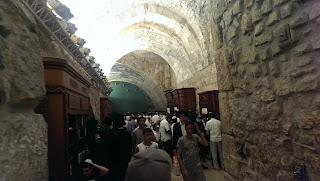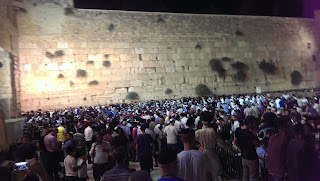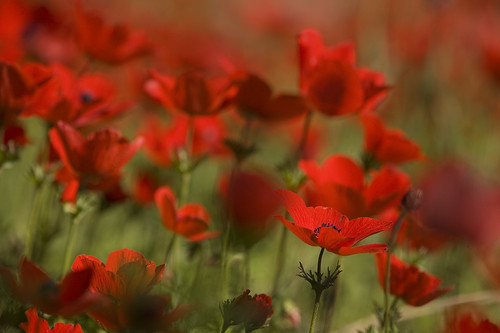Hearing as a Jew
Note: Yes, I know it has been far too long since I have blogged. There are reasons for that and I will get into them another time. For now, know that I have about 15 posts stewing in my head or on paper in various stages of completion. Some day I will get them all out. |
| The Kotel, Motzei Shabbos right before Rosh Hashanah |
The Second of Tishrei has just come to a close here in Eretz Yisrael, and Rosh Hashanah is past. This year, during the 10 Days of Awe, I actually feel that awe.
A friend of mine asked me today: "How was it?" "What?" I responded. "The last several days. How have they compared?" I thought about it, and I told him that I felt like I was actually inside the liturgy.
 |
| The tunnel right next to the Kotel |
Right after Shabbos, I went with a friend to Jerusalem. We went to the Kotel just after midnight to join many others in saying Selichot. It was an experience for sure.
But, let me backup just one more step even further to earlier in that same day. I was called up for the 4th aliyah on Shabbos. The parshah of the week was Vayelech. Here is a translation of the text I was called up for:
Then, Moses commanded them, saying, "At the end of [every] seven years, at an appointed time, in the Festival of Succoth, [after] the year of release, When all Israel comes to appear before the Lord, your God, in the place He will choose, you shall read this Torah before all Israel, in their ears. Assemble the people: the men, the women, and the children, and your stranger in your cities, in order that they hear, and in order that they learn and fear the Lord, your God, and they will observe to do all the words of this Torah. And their children, who did not know, will hear and learn to fear the Lord, your God, all the days that you live on the land, to which you are crossing the Jordan, to possess.
 |
| The view of the Kotel I saw as I entered the plaza just after midnight |
I was thinking about this as I went with my friend to the Kotel that night. What better example can there be of Jews possessing "the land" than seeing them congregate in Jerusalem. That night, the streets were packed. Stores and restaurants were open. It could just have easily been 7pm as it was 12am. There was an energy in the city that I felt. And when we finally made it to the Western Wall Plaza, all I could think about was the miracle that this was even possible. That I was in Israel. That Israel existed. That the Jews--a people in exile for 2000 years--existed. I was standing among people that all had a story to tell about how they got there in that moment.
I prayed for a lot that night, and of course my children were a large focus of my attention. And it is the focus on children that helps Judaism survive. More than anything else, we learn that children must come first. To paraphrase a piece of commentary I read today (I will come back with a more exact cite later):
A man looking forward to next year will plant crops.
A man looking forward to the next 10 years will plant trees.
A man looking forward to the next 100 years will educate children.
How true is that!
Which brings me back to what I was feeling that last couple days in shul: complete connection with the liturgy. For anyone that knows me, my Hebrew is so so. Generally when I daven, I read only the Hebrew. From past experience I know enough about what I am saying that I rarely reference the English page for a translation. But I felt that the people around me this year on Rosh Hashanah were so deeply connected to their prayers, I had to know exactly what each line meant. I davened just about the whole service twice. Once in Hebrew, and then again in English. I was struck.
And then I thought about it. About my own disconnections, and those of English-speaking Jews such as myself. Perhaps, just perhaps, one way to solve the future generation's apathy towards religion is to let them experience what I did this past Rosh Hashanah. And how can we do that? By letting them hear the prayers in Hebrew.
Just like the Torah says: by letting them hear. Not in English. In Hebrew. And, if we want them to hear, they need to know Hebrew. Let's all teach our children not just how to read and write Hebrew. Maybe even conversing in Hebrew is not the key. But maybe letting them hear in Hebrew is the answer.
.png)


0 comments: